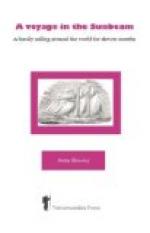[Illustration: Quarantine Island, Papeete]
CHAPTER XIV.
AT TAHITI.
The cava feast, the yam, the cocoa’s root, Which bears at once the cup, and milk, and fruit, The bread-tree which, without the ploughshare, yields The unreap’d harvest of unfurrowed fields.
* * * * *
These, with the luxuries of
seas and woods,
The airy joys of social solitudes,
Tamed each rude wanderer.
[Illustration: Under the Trees, Papeete]
Saturday, December 2nd.—The anchor was dropped in the harbour of Papeete at nine o’clock, and a couple of hours later, by which time the weather had cleared, we went ashore, and at once found ourselves in the midst of a fairy-like scene, to describe which is almost impossible, so bewildering is it in the brightness and variety of its colouring. The magnolias and yellow and scarlet hibiscus, overshadowing the water, the velvety turf, on to which one steps from the boat, the white road running between rows of wooden houses, whose little gardens are a mass of flowers, the men and women clad in the gayest robes and decked with flowers, the piles of unfamiliar fruit lying on the grass, waiting to be transported to the coasting vessels in the harbour, the wide-spreading background of hills clad in verdure to their summits—these are but a few of the objects which greet the new-comer in his first contact with the shore.
We strolled about, and left our letters of introduction; but the people to whom they were addressed were at breakfast, and we were deliberating how best to dispose of our time, when a gentleman accosted us, and, seeing how new it all was to us strangers, offered to show us round the town.
The streets of Papeete, running back at right angles with the beach, seem to have wonderfully grand names, such as the Rue de Rivoli, Rue de Paris, &c. Every street is shaded by an avenue of high trees, whose branches meet and interlace overhead, forming a sort of leafy tunnel, through which the sea-breeze passes refreshingly. There is also what is called the Chinamen’s quarter, through which we walked, and which consists of a collection of regular Chinese-built bamboo houses, whose occupants all wore their national costume, pigtail included. The French commandant lives in a charming residence, surrounded by gardens, just opposite the palace of Queen Pomare, who is at present at the island of Bola-Bola, taking care of her little grandchild, aged five, the queen of the island. She went down in a French man-of-war, the ‘Limier,’ ten days ago, and has been obliged to remain, owing to some disturbances amongst the natives. I am rather disappointed that she is absent, as I should like to see a person of whom I have heard so much.
Having completed our tour, we next went to call on the British Consul, who received us kindly, and entertained us with an interesting account of the island and its inhabitants, its pearl-fisheries and trade, the French policy, the missionaries, &c., on all of which subjects he is well informed. He has just completed an exhaustive consular report on the condition of the island, which will, no doubt, appear in due course in the form of a blue-book.




